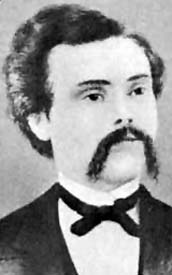Alexander McSween facts for kids
Quick facts for kids
Alexander McSween
|
|
|---|---|

McSween c. 1875
|
|
| Born | June 15, 1837 |
| Died | July 19, 1878 (aged 41) Lincoln, New Mexico, U.S.
|
| Occupation | Lawyer |
| Known for | Death in Battle of Lincoln |
| Spouse(s) | |
Alexander McSween (born June 15, 1837 – died July 19, 1878) was an important person during the Lincoln County War. This conflict happened in the Old West. McSween was a main leader who stood against powerful businessmen Lawrence Murphy and James Dolan.
Contents
Early Life of Alexander McSween
Alexander Anderson McSween was born in Canada on June 15, 1837. His family was of Scottish background. He was born in either Nova Scotia or Prince Edward Island.
McSween studied at law school for one year in St. Louis, Missouri. After that, he moved to Kansas and then to New Mexico Territory. He married Susan Hummer on August 23, 1873, in Atchison, Kansas. They lived in Eureka, Kansas. In 1875, they moved to Lincoln, New Mexico. There, McSween started working as a lawyer for a company owned by Irish Catholic immigrants Lawrence Murphy and James Dolan.
However, after arriving in Lincoln County, New Mexico, McSween left Murphy and Dolan. He began working for John Tunstall, an English rancher and businessman. McSween and Tunstall became good friends. By 1876, they were also business partners.
The Lincoln County War Begins
Problems started between the two groups. Murphy and Dolan accused McSween of taking money that wasn't his. They hired gunmen from the Evans and Kinney gangs. These gunmen stole Tunstall's cattle and caused trouble for him.
To protect themselves, McSween and Tunstall hired a group of cowboys. They called themselves the Lincoln County Regulators. Famous members included Billy the Kid, Dick Brewer, George Coe, and Frank Coe.
On February 18, 1878, Tunstall was shot and killed. This happened while he was supposedly resisting arrest. Lincoln County Deputies William Morton, Jesse Evans, and Tom Hill were involved.
Regulators Take Action
After Tunstall's death, McSween arranged for the Regulators to become special police officers. A local judge, who was friendly with McSween and Tunstall, swore them in. On March 6, 1878, the Regulators arrested Frank Baker and Deputy William Morton. They were killed shortly after.
On April 1, 1878, Billy the Kid and other Regulators entered Lincoln. They attacked and killed Lincoln County Sheriff William J. Brady and Deputy George W. Hindman.
A few days later, on April 4, 1878, a gunfight happened at Blazer's Mill. This fight was between Buckshot Roberts, who worked for the Murphy-Dolan side, and the Regulators. Both Roberts and Regulator Dick Brewer were killed. Other Regulators were wounded in the fight.
On April 18, 1878, Billy the Kid and some other Regulators were accused of Sheriff Brady's murder. On the same day, Dolan, Deputy Jesse Evans, and others were accused of John Tunstall's murder.
The Battle of Lincoln
On July 15, 1878, the Regulators were surrounded in Lincoln. They were at McSween's home with McSween and his law partner, Harvey Morris. Facing them were the Dolan/Murphy cowboys, led by Sheriff George Peppin.
The fight lasted four days. On July 19, the house was set on fire. As the fire grew and night came, Susan McSween was allowed to leave the house safely. The men inside tried to fight the fire.
Around 9 p.m., the Regulators and McSween planned to escape the burning house. Jim French went out first, followed by Billy the Kid, Tom O'Folliard, and Jose Chavez y Chavez. The Dolan men saw them running and started shooting. Harvey Morris was killed. Some US Cavalry soldiers had arrived. They were there to arrest people and stop more killings. A close gunfight broke out. McSween, wearing a white shirt, was an easy target and was killed. A cowboy named Bob Beckwith was also killed.
Legacy of the Lincoln County War
With Alexander McSween's death, the Lincoln County War mostly ended. His widow, Susan McSween, later married a businessman named George Barber. That marriage ended in divorce.
Susan McSween later bought a ranch in Three Rivers, New Mexico. She became one of the most important cattlewomen in the Old West. In 1902, politician Albert Fall bought her ranch. Susan then moved to White Oaks, New Mexico. She lived there until she passed away in January 1931, at 85 years old.
See Also
- Lincoln County War
- Billy the Kid
- John Tunstall
- Susan McSween
 | Lonnie Johnson |
 | Granville Woods |
 | Lewis Howard Latimer |
 | James West |

